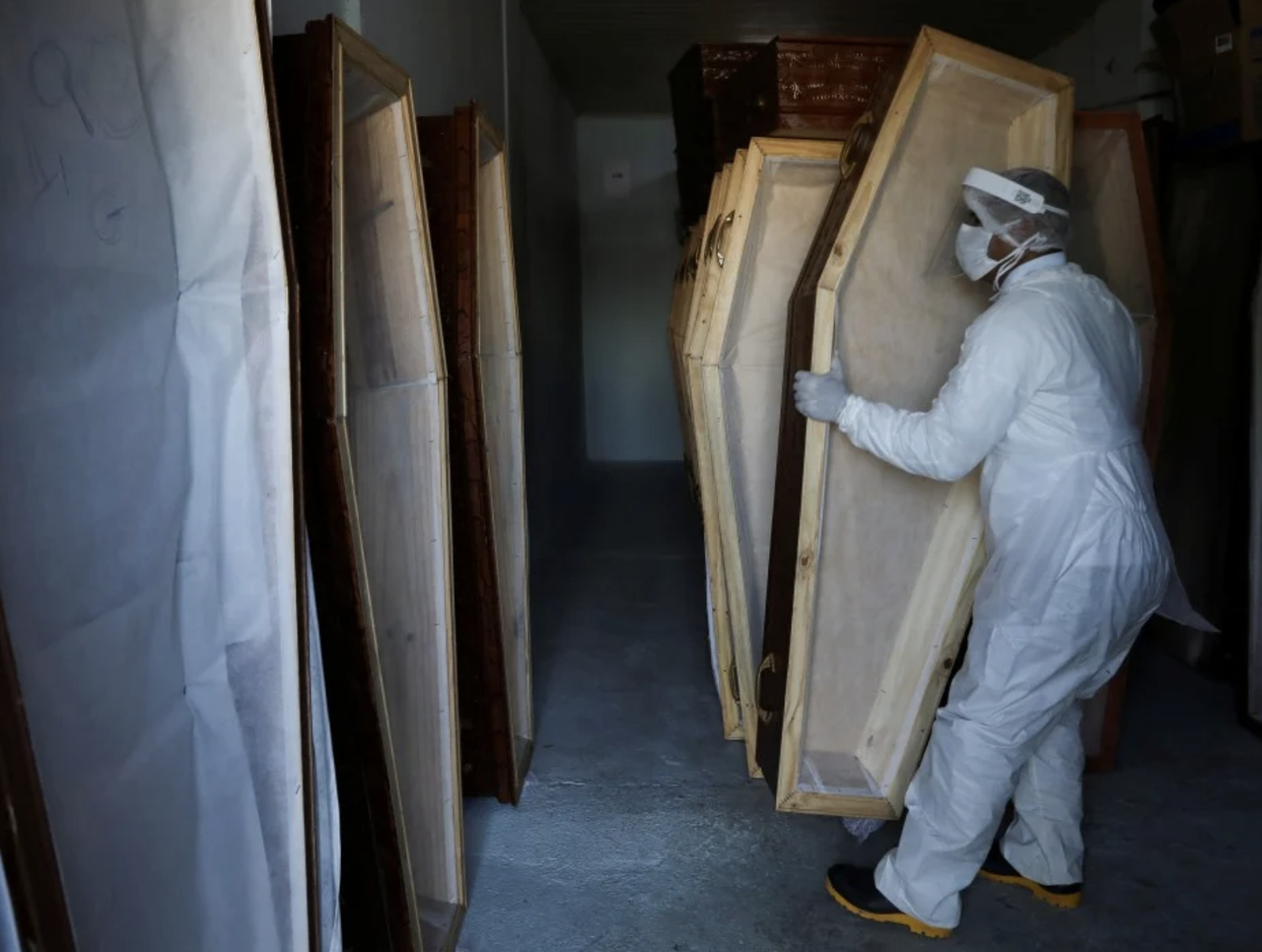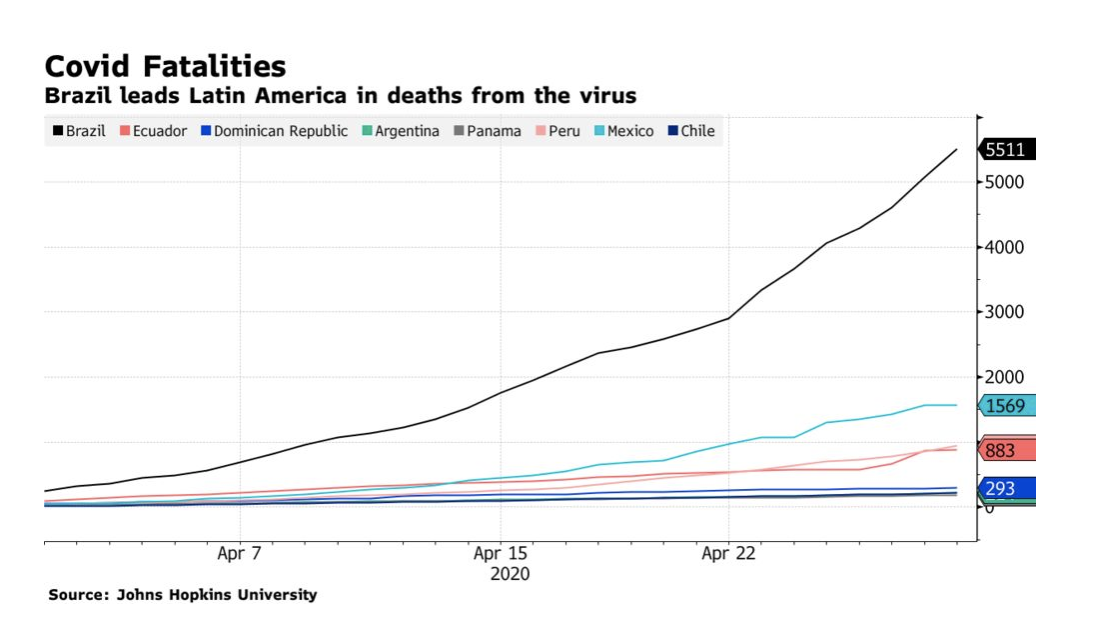Brazil’s Neighbors Close Borders As Latin America’s Biggest COVID-19 “Hot Spot” Reopens
Brazil hasn’t even confirmed 100k cases of COVID-19. Yet, government officials across South American fear the largest country on the Continent, which shares a land border with every country in South American except 2 (Ecuador and Chile), has already become one of the world’s most dangerous hot spots.
Even some epidemiologists in the US have warned that, if left unchecked, Brazil’s outbreak could jeopardize the rest of the hemisphere and destroy all of the hard work accomplished by lockdowns and other extreme social distancing measures. Yesterday, Brazil’s far-right President Jair Bolsonaro insisted there was nothing he could do to stop or mitigate the outbreak – despite all obvious evidence to the contrary.
“So what?” he said. “I’m sorry. What do you want me to do?”
“My name’s Messiah,” Bolsonaro added, a reference to his second name, Messias. “But I can’t work miracles.”
Though governors in nearly all of Brazil’s 26 provinces imposed some level of restrictions, across the country, businesses are reopening and people are returning to work as states like Santa Catarina and Mato Grosso do Sul have dialed back restrictions on malls, gyms and churches. Most Brazilians appear to be more or less returning to their regular way of life. Demand is up at gas stations across the country. Government tracking data have shown that people are getting out more, even in places like Sao Paolo – where most restrictions remain in place.
As we noted, on Tuesday, Brazil reported its highest single-day death toll since the pandemic hit the country in late February. In 24 hours, Brazil recorded 474 fatalities. On Wednesday, another 449 people died. Still, the number of confirmed cases has nearly doubled to 78,162 in the last week, while deaths have climbed to ~5,500. Experts say insufficient testing has hidden what were probably much higher numbers.
But despite fears that the virus has penetrated much further into Brazilian society than the data suggest, roughly 10% of Brazil’s malls have reopened in the past couple of weeks. And in some places, Brazilians rushed in by the thousands to shop. One photo drew the attention of law enforcement as the tightly packed crowds created ideal conditions for the virus to spread.
In Sao Paulo, the epicenter of Brazil’s outbreak, quarantine restrictions are slated to stay in effect until May 11. But mobile phone data shows the so-called “isolation rate” – a critical figure used by officials to evaluate the virus response – has fallen to less than 50% over the past few days, well below the 70% level authorities believe is necessary to halt the spread of disease. And more and more, reporters are relaying stories of public health hospitals in Amazonas – a sparsely populated jungle region in the middle of the Amazon rain forest – as well as in Ceara, Rio de Janeiro and Para.
Source: Bloomberg
The flow of people, local media reported health authorities are probing a mall in the southern city of Blumenau after local media showed crowds packing in for the reopening.
And that only scratches the surface of the chaotic scenes unfolding across the country. Since there’s no coordination happening from above, there’s no consensus on how states should return to business as usual.
Reopened Retailers and factories say in corporate filings seen by Bloomberg that they are following local regulations and taking measures to ensure the safety and health of employees and clients.
Given Brazil’s massive population and economic heft, whether the country manages to reopen without triggering a Wuhan-level outbreak – something that remains a big “if” – will be a critical issue for the country’s neighbors, and possibly even for Mexico and the US. It’s possible that a roaring, out-of-control outbreak in Brazil could sweep all the way across the continent then northward to slam the southern US just as life is returning back to normal.
In a reflection of the massive gulf between the ‘official’ death toll and the reality on the ground, deaths from the outbreak have piled up so fast in the Amazon rainforest’s biggest city that the main cemetery is burying five coffins at a time in collective graves, according to the SCMP.
The mayor’s office said the city’s funeral system was collapsing and running out of coffins. Undertakers are burying coffins one on top of the other. Though the city of Manaus stopped the practice after relatives complained.
Brazil’s neighbors are already taking steps – some are taking drastic steps – to stop Brazilians from spreading the virus.
In Argentina, the big worry is truck traffic from Brazil.
Argentine officials say they are particularly worried about truck traffic from Brazil, their top trading partner. In provinces bordering Brazil, Argentina is working to set up secure corridors where Brazilian drivers can access bathrooms, get food and unload products without ever coming into contact with Argentines.
“Brazil worries me a lot,” Argentine President Alberto Fernandez said. “A lot of traffic is coming from Sao Paulo, where the infection rate is extremely high.
Uruguay had a recent incident where several Brazilian workers crossed the border to help build a cement plant. Four ended up testing positive.
In Uruguay, President Luis Lacalle Pou said the spread of the virus in Brazil was setting off “warning lights” in his administration and authorities are tightening border controls in several frontier cities.
Thirty workers recently crossed from Brazil to the Uruguayan border city of Rio Branco to help build a cement plant. Four tested positive for the virus, prompting Uruguay to place the whole crew in quarantine.
Officials in some Uruguayan border towns have discussed setting up “humanitarian corridors” through which Brazilians could safely leave the country.
Colombia is worried about the long-term impact on public health and its economy.
Authorities in Colombia are also worried, said Julian Fernandez Nino, an epidemiologist at National University in Bogota.
“In a globalised world, the response to a pandemic can’t be closed frontiers,” he said. “Brazil has great scientific and economic capacity, but clearly its leadership has an unscientific stance on fighting coronavirus.”
Even Bolsonaro’s biggest regional ally, Bolivia, is closing its border.
Bolivia’s government, a right-wing ally of Bolsonaro’s, declined to comment on its neighbour’s antivirus measures, but Defence Minister Fernando Lopez promised this month to strongly enforce the closure of the border.
“If we keep being flexible on the border, our national quarantine will be useless,” he said.
That’s definitely not a good look for Bolsonaro.
Tyler Durden
Thu, 04/30/2020 – 20:00
via ZeroHedge News https://ift.tt/3bTiwnj Tyler Durden

